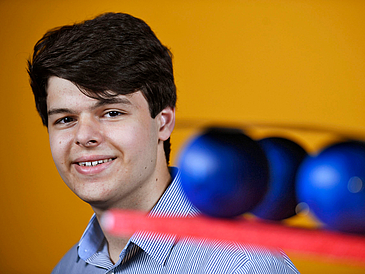A shining example of how the University of Bremen not only stands by its own students and doctoral candidates, but also students still in high-school: Arta Safari recently took third place for Chemistry in the nation-wide youth science competition “Jugend forscht”. On top of this, he received the special prize for linking theory to chemistry practice. The 17-year-old student from the Alte Gymnasium high school in Bremen was helped to this impressive success through a skilful combination of support and infrastructure placed at his disposal by the Fraunhofer IFAM Institute and two research groups at the University.
A fascination for quantum simulations
Arta Safaris just can’t get enough of quantum simulations. “I work with a model system that enables me to do computer simulations on the chemical behavior of molecules”, he explains. Sounds easy, doesn’t it? But in order to do this, the 17-year-old has to carry out highly complex formula calculations. He even holds lectures on his work to groups of research academics – in English! Arta is very grateful that the University and the Fraunhofer IFAM Institute made his research possible.
Support from several mentors
“We are absolutely delighted that Arta Safari has received this recognition”, says Professor Lucio Colombi Ciacchi, leader of the international research group “Hybrid Materials Interfaces” at the University of Bremen. “It was very rewarding to accompany such a talented young man on his way to success.” Arta was mentored by a member of Ciacchi’s research group, Nils Hildebrand. Other helpers were Dr. Arne Wittstock and Professor Marcus Bäumer from the University of Bremen’s Institute for Applied and Physical Chemistry as well as Felipe Macul Perez and Dr. Michael Noske in the department led by Professor Bernd Mayer at the Fraunhofer IFAM Institute.
What is Arta Safari’s research all about?
Certain enzymes develop surface coatings consisting of only one molecule layer. Arta Safari believes these so-called monolayers might be caused to act as highly efficient catalysts. So far, though, there is scarce knowledge about the forces at play in the deposition process. Our young researcher creates computer simulations of interactions of the laccase enzyme with surfaces comprising silicon dioxide as well as graphenes – a special form of carbon. In the course of his research, Arta discovered that when applied to silicon dioxide, laccase becomes fixed by electrostatic interactions. On the other hand, graphenes cause the charged clouds of enzyme components and carbons to overlap. Owing to the fact that this bonding is particularly strong and independent from external factors, graphenes would subsequently appear to be ideal carriers for bio-catalysts.
If you would like to have more informaation on this topic, feel free to contact:
University of Bremen
Faculty of Production Engineering – Mechanical Engineering & Process Engineering
Hybrid Materials Interfaces Group
Prof.Dr. Lucio Colombi Ciacchi
Phone: +49 421 218 64570
email: colombiprotect me ?!hmi.uni-bremenprotect me ?!.de

